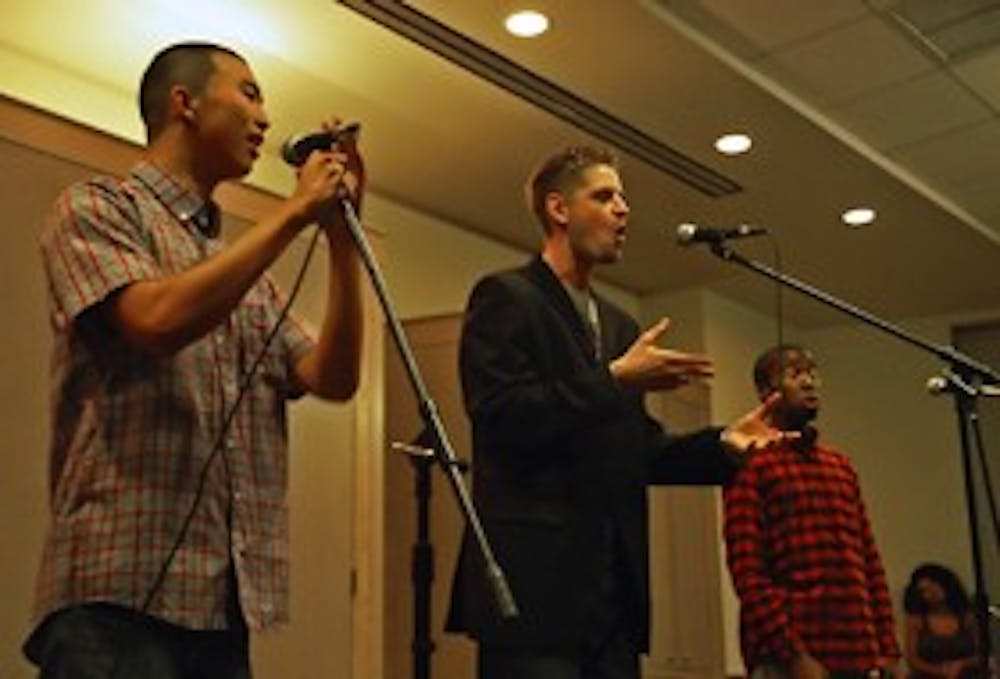
College freshman Miles Hodges didn’t initially plan to “do the whole college thing.”
But his involvement in the world of spoken word poetry changed his mind by connecting him, at age 16, to now-College seniors Alysia Harris and Joshua Bennett. They would eventually not only convince him to come to Penn but also to help make the transition “seamless.”
Along with Harris and Bennett, Hodges and a handful of other students feel at home at Penn because of their participation in The Excelano Project, Penn’s first and only spoken word group.
Since the group was founded in 2003, it has typically had between nine and 13 members. EP performers have been featured at the White House, on HBO in the documentary “Brave New Voices” and on Broadway.
Despite this wide range of impressive venues, the members of EP generally agreed that they prefer performing at Penn.
College and Wharton senior Melissa Pavri explained that this is because “we just have such loyal, loyal fans.”
Auditions for EP include not only the performance of three to four minutes of original material, but also a discussion of how well a potential new member will fit in with the group’s dynamic, said Chloe Wayne, a College and Wharton senior and the director of EP.
It’s important for new members to fit into the group, because much of the material is sensitive. Plus, the members learn to think of each other as family, explained Harris.
“We’re sharing parts of ourselves we don’t necessarily share with our roommates or our families,” said Wayne. “I’ve seen every single person [in EP] cry some serious tears.”
The poets’ creativity comes from a myriad of different places and things, from the mundane to the profound. Or, as College junior Justin Ching put it, “life.”
“The way I started writing actually was ... sheer inspiration to start writing,” said Pavri of her experience. “Excelano doesn’t censor your writing.”
“As long as it’s honest,” added Ching.
“The reason EP is so … easy to relate to is we cover such a broad range of topics in our pieces,” added Pavri. “Our shit is so diverse.”
The pieces are varied in ways beyond just the topics covered — some are better translated to the stage, while some are more appropriate for print.
In this vein, the members of Excelano just published their first book, Sunlight Through a Keyhole, which was sold at their shows over last weekend and will be available “whenever people want it,” said Ching.
The book consists of the work by the 13 current members of EP and one more who is currently abroad.
“A lot of people have a little to a lot of stuff sitting around,” said Wayne.
“Not all of our stuff is fit for the stage,” added Pavri.
The process for picking poems that are actually performed, however, is “organic,” Wayne described, and simply facilitated by the director. This means everyone contributes as much as they want to, and tries to find the best possible balance of content.
“We don’t want to have the audience leaving completely depressed and nihilistic about life,” said Wayne. The group tries to intersperse heavy pieces with more lighthearted ones, he added.
The group meets twice a week for around an hour to collaborate and throw around ideas in informal meetings, Wayne said.
“Formality wouldn’t be conducive to our writing process,” she explained.
Though the members of EP primarily write on their own time, the amount of time spent writing poems varies greatly.
Ching said collaborative efforts or “collabs” tend to be more easy to write for him, since “you feed off collective energy,” though some topics, like love, are more easy to write about alone.
Though these pieces may be easy to write, they aren’t necessarily easy to perform.
“I broke down on the stage in front of, like, 500 people,” said Ching, on performing a poem about a woman he loved who didn’t come to his show.
Even in emotional cases like this, however, the members of EP agree that performing can be therapeutic.
“It’s empowering once you’re able to take control of a moment that owned you,” explained Harris. “A lot of healing process goes into writing and performing.”
Ching added that the intangible, unspoken aspect of spoken word poetry is the element that makes it so special and different from the simply written.
“Excelano birthed all of us as poets,” said Pavri. “Even if some of us were poets before or will be after.”
The Daily Pennsylvanian is an independent, student-run newspaper. Please consider making a donation to support the coverage that shapes the University. Your generosity ensures a future of strong journalism at Penn.
DonatePlease note All comments are eligible for publication in The Daily Pennsylvanian.




